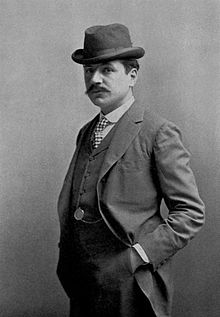Paul Charles Joseph Bourget
| Paul Charles Joseph Bourget | |
|---|---|

Paul Bourget in 1899
|
|
| Born |
2 September 1852 Amiens |
| Died | 25 December 1935 (aged 83) Paris |
| Resting place | Montparnasse Cemetery |
| Occupation | Novelist, critic |
| Nationality | French |
| Alma mater | Lycée Louis-le-Grand, École des Hautes Études |
| Notable works | Le Disciple |
Paul Charles Joseph Bourget (French: [buʁʒɛ]; 2 September 1852 – 25 December 1935) was a French novelist and critic.
Paul Bourget was born in Amiens in the Somme département of Picardy, France. His father, a professor of mathematics, was later appointed to a post in the college at Clermont-Ferrand, where Bourget received his early education. He afterwards studied at the Lycée Louis-le-Grand and at the École des Hautes Études.
Between 1872 and 1873, he produced a volume of verse, Au Bord de la Mer, which was followed by others, the last, Les Aveux, appearing in 1882. Meanwhile, he was making a name in literary journalism and in 1883 he published Essais de Psychologie Contemporaine, studies of eminent writers first printed in the Nouvelle Revue, and now brought together. In 1884 Bourget paid a long visit to Britain, where he wrote his first published story (L'Irréparable). Cruelle Enigme followed in 1885; then André Cornelis (1886) and Mensonges (1887) - inspired by Octave Mirbeau's life - were received with much favour.
Bourget, who had abandoned Catholicism in 1867, began a gradual return to it in 1889, fully converting only in 1901. In 1893, in an interview he gave in America, he spoke about his changed views: "For many years I, like most young men in modern cities, was content to drift along in agnosticism, but I was brought to my senses at last by the growing realization that...the life of a man who simply said 'I don't know, and not knowing I do the thing that pleases me,' was not only empty in itself and full of disappointment and suffering, but was a positive influence for evil upon the lives of others." On the other hand, "those men and women who follow the teachings of the church are in a great measure protected from the moral disasters which...almost invariably follow when men and women allow themselves to be guided and swayed by their senses, passions and weaknesses." These were the themes of his novel Le Disciple (1889), which he wrote, as he says in his American interview, just after abandoning his "drifting and comfortable belief in agnosticism". It is the story of philosopher Adrien Sixte, whose advocacy of materialism and positivism wields a terrible influence over an admiring but unstable student, Robert Geslon, whose actions, in turn, lead to the tragic death of a young woman.Le Disciple caused a stir in France and became a bestseller. Exemplifying the novelist's graver side, it was one of Gladstone's favourite books.John Cowper Powys listed Le Disciple at number 33 in his One Hundred Best Books.
...
Wikipedia
